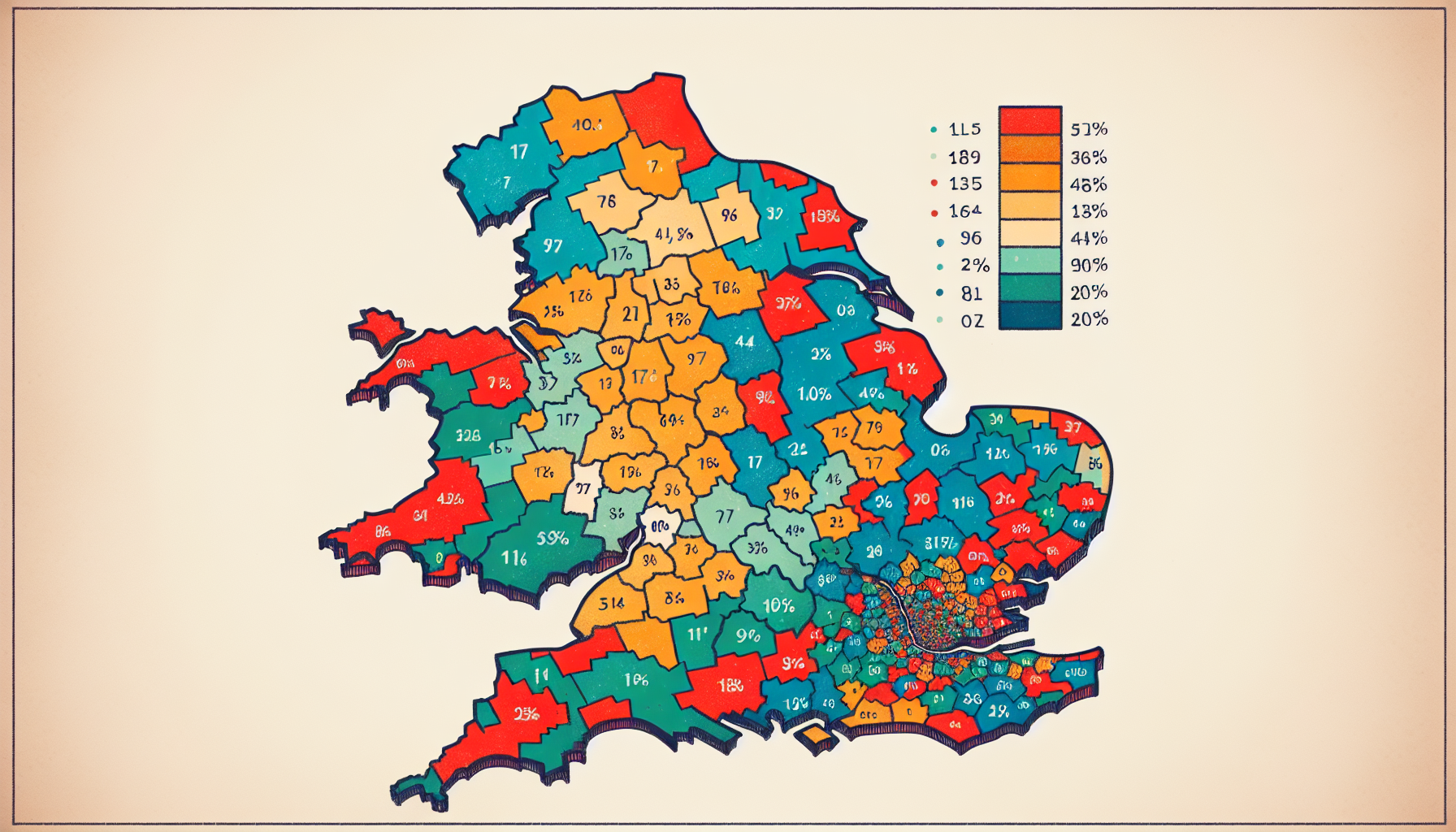Decoding Success: What Percentage of Pupils Pass the 11 Plus Exam?
The 11 Plus exam, a key gateway to selective secondary schools, is a significant milestone in the academic journey of many students in the United Kingdom. The results of this test can shape a student’s future, opening doors to prestigious grammar schools and other selective institutions. But what lies behind this crucial examination? What factors influence “what percentage of pupils pass the 11 plus”? Let’s unravel the veil and delve into the world of the 11 Plus exam.
Key Takeaways
- The 11 Plus exam has an estimated pass rate of 30%, This figure is influenced by different factors.
- Regional insights show varying pass rates across different geographical areas, with 80% mark typically needed to pass in high-density grammar school regions.
- Personal factors such as academic support, resources and study habits have a major impact on success in the 11 Plus exam.
Deciphering the Pass Rate: Understanding the Percentage of Pupils Passing the 11 Plus

Every year, around 100,000 students take the 11 Plus exam to gain access to selective secondary schools. The pass rate is estimated at 30%, but this can vary depending on various factors such as the location of the school and time of examination. Estimating an accurate pass rate for these exams proves to be difficult due to their competitive nature and different levels of difficulty across regions. In England specifically, a mere 5% out of all Secondary Students can secure admission through passing this exam. Even attaining qualifying scores does not guarantee placement in grammar schools!
Regional Insights: Examining Pass Rates Across Different Areas

When analysing regional variations of 11 Plus pass rates, disparities become apparent. In London, around 70% pass mark was needed for the exam, while in Northern Ireland only 45%. This highlights a requirement for equal access to education no matter where students live or their economic situation. On closer inspection, two major factors affecting success can be identified: dense grammar school regions and local authorities’ roles.
Grammar schools are known to have higher-density populations which correlate with better performance on standardized exams such as the 11 Plus due to differences in curriculums, preparedness techniques and resources provided. Yet all should still enjoy educational opportunities without discrimination from location or socioeconomic levels. Local Authorities’ position plays an important role since they offer preparatory materials, and arrange test centres and other provisions that make it easier for children everywhere, not just those attending high-end private institutions, to have access to them if needed.
Overall there is evidence indicating that geography has a great impact on 11 plus scores, leading us to emphasize fairness when providing educational experiences regardless of geographical region within the UK.
How Many Pupils Pass in High-Density Grammar School Regions?
Certain local authorities in England, such as Bexley, Buckinghamshire, Kent and Lincolnshire, are known to have high numbers of grammar schools. These areas tend to see far higher success rates on the 11 Plus exam than those with fewer grammar school options. Around 80%, compared to the national average pass marks achieved by secondary pupils attending other types of schools, which is 27,6%. This reflects how competition can play a large role in determining student performance overall. There has been some concern about poorer students achieving lower outcomes at Grammar Schools versus their wealthier peers, something that must be addressed if these institutions are going to fairly contribute towards educational advancement for all sections of society!
The Impact of Local Authorities on Pass Rates
Local authorities have the capability of changing the 11 Plus landscape, from choosing exam providers to specifying questions and timings. According to the Department of Education, these selective schools in Bexley, Buckinghamshire and Kent are more ‘highly selective’ due to their unique criteria for passing or failing exams. Pass rates vary not only between different schools but even within one local authority. Scores needed to pass can be assessed through a norm-referenced system which ranks children against each other rather than determining individual thresholds.
The Role of School Types in 11 Plus Success

The 11 Plus exam results for students are heavily impacted by their school type. Grammar schools require a remarkable 80% pass mark, while academies and free schools report success rates of 50-60%. This distinction can be attributed to the level of teaching experience within these institutions as well as more formal preparation methods. Comprehensive schools display an average pass rate of around 58%, highlighting the importance of choosing suitable educational environments when enrolling your child into secondary education. Grammar schooling plays a decisive role in successful test performance in this national assessment program.
Key Factors Influencing Pupil Success in the 11 Plus
When taking the 11 Plus exam, besides school type and geographic location, personal qualities are major contributors to success. These include proper study habits such as setting achievable goals, being organized when studying for a test and knowing when it is time to take breaks. Along with access to tutoring, students can refine their Maths and English skills, which are essential in passing this examination. Having educational resources at one’s disposal, including comprehensive guides or old exams, proves beneficial too. Getting hold of these past papers is highly recommended since they help pupils know what kind of questions will be asked on assessment day.
Academic Support and Resources
To be well-prepared for the 11 Plus exam, pupils must have access to various educational resources and support. These can include free maths tools, practice papers, study guides, workbooks and online tests. Tutoring is also beneficial when it comes to refining Maths and English skills. Boosting progress by teaching effective techniques used in Verbal sections of the exam. Though not required for success on this test, many students manage without tutorial help.
Study Habits and Exam Preparation
For 11 Plus exam success, students must develop productive study habits and effective examination preparation techniques. To maximize performance on the test, some of the most efficient approaches include: setting achievable objectives, taking breaks between studying sessions, and keeping organized notes and materials and prioritising long-term benefits over short-lived satisfaction. By following these tips one can increase their chances of success on exams.
To foster comprehension levels of content material as well as revise frequently for tests, pupils should use practice papers regularly to become accustomed to various question types posed by the exam format while using available time wisely during assessment administration. Understanding how to approach varied questions provides a considerable advantage when sitting down for an important examination such as this one, which will ultimately contribute toward maximizing overall exam performance among all participants involved!
What Does the 11 Plus Assess?
The 11 Plus exam is an all-encompassing assessment of students, encompassing their English and Maths knowledge, as well as verbal reasoning, non-verbal reasoning and numerical reasoning skills. The aim for the pupils is to show academic excellence moving forward.
Specifically about verbal reasoning, the test provides a good indication of how analytically adept they are compared with learning from memory alone, while nonverbal evaluation looks at problem-solving using visual logic techniques.
By undertaking this comprehensive examination it allows a better understanding of what level each student’s aptitude stands, which gives them every opportunity possible towards achieving success academically going forth.
Navigating the Admissions Process: From Application to Acceptance

Navigating the admissions process for 11 Plus can be challenging, but with the appropriate knowledge and preparation, it is feasible. Parents must get started on making applications during the Summer of Year 5 if their child wants to take this exam in the coming year.
Being aware of registration periods, which usually start in May and last about two months, is also vital since most grammar schools administer these tests around September time each year. Subsequently, those who pass are welcomed into Year 7 at one of 164 different grammar institutions by September of that same academic year.
Preparing for the Outcome: Post-Exam Strategies
The 11 Plus examination can bring forth different emotions when the outcome doesn’t meet the expected levels. It is essential to note that there are always other pathways available for those who don’t pass. Retaking the exam, searching for schools with no need of an eleven-plus result or homeschooling could be options. Depending on the area and institution, a process of appeal might exist in case results do not satisfy initial expectations, though rules may change according to circumstances. Maintaining positivity during this period is key since it’s just one stage within a lengthy academic journey, regardless of successful or otherwise!
Addressing Common Questions and Concerns About the 11 Plus
The 11 Plus exam is regularly a source of questions and worries among parents and students alike. From feeling overwhelmed by the material to stressing about not completing it within the time frame, these anxieties are understandable.
A common inquiry is whether only academically gifted pupils can excel in this assessment. That’s simply not true – it’s intended to evaluate academic skill levels across grammar schools, private or independent institutions, as well as other educational bodies for candidates with suitable aptitude for scholastic excellence.
Tutoring might be helpful but isn’t obligatory for success on the 11 Plus examination.
Summary
When analysing the success rate of the 11 Plus exam, a range of variables must be taken into consideration. The availability and prominence of grammar schools in an area, as well as local authorities’ actions, weigh heavily on pass rates. It is also necessary to consider what type of school students attend when looking at results. More so than ever before given that education has been drastically altered by COVID-19 measures.
Simply relying on external factors may not lead someone to guaranteed success, it takes academic support combined with sound study habits and resources for optimal performance during this important assessment process. As we grapple with understanding how these influential pieces fit together remember one thing: although it marks a milestone, passing or failing the 11 plus does not have to dictate overall student achievement since there are many paths available towards reaching educational goals.
Frequently Asked Questions
What percentage of people pass the 11+?
Typically, 80 per cent of students succeed in their 11 Plus exam. The qualification mark Vary from one school to another and depends on the administering board each year. Relevant pass marks for past examinations can be sourced through a particular institution’s website. Thus, it is paramount that pupils familiarize themselves with these benchmarks before attempting the test so as not to miss out on what they are striving for – success!
Can an average child pass the 11+?
The pass marks for 11 Plus exams in prior years can usually be found on the websites of each school, and it is suggested that an average student should expect to reach a mark of around 80% for success. This estimation may differ based on certain conditions, yet still demonstrates enough potential for most children to clear this test.
What is the average score for 11+?
The 11+ score typically ranges from 100, with the bottom 10% at 80 or below and the top tier scoring 120 or higher.
What is an 11-plus exam?
Students in Year 6 take the Eleven Plus exam to evaluate their potential for attending grammar or selective schools. This assessment is designed to help them transition from primary school education and gauge if they are ready for this next step of learning.
Is tutoring necessary for success in the 11 Plus exam?
Many students have managed to score highly in the 11 Plus exam without seeking any tutoring, showing that it is not a necessity for success.







